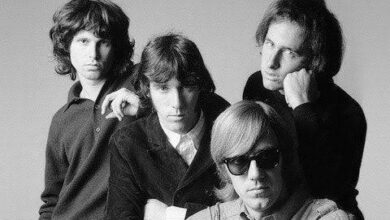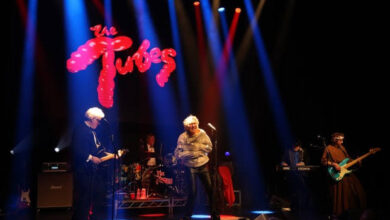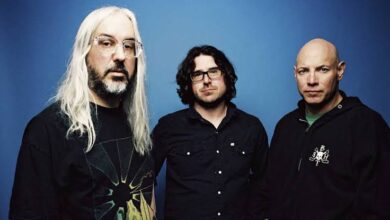Heartbreaking: The Cure Frontman Robert Smith Reportedly Dies of Food Poisoning…

The Cure’s Robert Smith Reportedly Dies of Food Poisoning: A Shocking Loss to the Music World
In a tragic turn of events, Robert Smith, the iconic frontman of the legendary band The Cure, has reportedly died at the age of 65 from complications related to food poisoning. The news has sent shockwaves through the music community, leaving fans around the world in disbelief. As one of the most influential figures in alternative rock and gothic music, Smith’s sudden passing marks the end of an era for fans of his unique sound and profound influence on the genre.
A Staggering Loss
On April 9, 2025, sources close to the singer confirmed that Robert Smith had passed away after falling ill from what initially appeared to be a mild case of food poisoning. What was first suspected to be a minor illness quickly escalated, and despite receiving medical attention, Smith’s condition worsened over the course of several days. According to initial reports, Smith had consumed a meal at a private gathering a few days before his hospitalization, which may have led to his fatal illness. Doctors believe that a particularly aggressive strain of bacteria in the food contributed to the tragic outcome.
The death of Robert Smith has devastated his family, bandmates, and millions of fans who cherished his distinctive voice and unforgettable presence. Smith had been a towering figure in the music industry for decades, and his work with The Cure was instrumental in shaping the sound of gothic rock, post-punk, and new wave music.
The Iconic Legacy of Robert Smith
Robert Smith was born on April 21, 1959, in Blackpool, England, and from a young age, he showed a keen interest in music. His early influences included bands like The Beatles, David Bowie, and The Velvet Underground. However, it was The Cure, which Smith formed in 1976, that would make him a household name. Throughout the band’s illustrious career, Smith remained its constant driving force, contributing to its evolution and sound.
The Cure’s music, characterized by its haunting melodies, emotionally complex lyrics, and an ability to merge dark, melancholic elements with catchy pop sensibilities, made them stand out in the 1980s and beyond. Tracks like “Just Like Heaven,” “Boys Don’t Cry,” “Lullaby,” and “Pictures of You” became anthems for fans who resonated with Smith’s introspective songwriting and the band’s distinctive, atmospheric sound.
One of the key elements that set Smith apart as a performer and artist was his unique ability to connect with audiences on an emotional level. His dark and enigmatic persona, often marked by his signature wild hair, red lipstick, and pale complexion, became synonymous with the band’s aesthetic. However, beneath the gothic exterior, Smith was known for his gentle and thoughtful demeanor, which endeared him to fans and colleagues alike.
In interviews, Smith was often introspective and candid, sharing insights into his personal struggles with mental health, loneliness, and the complexities of love. His lyrics, which spoke to themes of isolation, longing, and emotional turmoil, spoke to an entire generation of listeners, cementing The Cure’s place as one of the most beloved bands in music history.
A Life of Music and Innovation
Under Smith’s leadership, The Cure revolutionized the alternative rock scene, pushing boundaries both musically and visually. The band’s early works, like Seventeen Seconds (1980) and Faith (1981), showcased Smith’s experimental approach to songwriting, blending post-punk rhythms with ethereal and atmospheric sounds. With the release of Pornography (1982), The Cure’s sound took a darker turn, paving the way for their signature gothic rock style. This era was marked by a mix of intense emotion and complex arrangements that set the band apart from their contemporaries.
The Cure achieved massive commercial success with albums like Disintegration (1989), which is widely regarded as one of their finest works. Tracks like “Lovesong” and the title track “Disintegration” were monumental hits and continue to resonate with fans worldwide. The album’s blend of atmospheric, layered sounds with emotionally charged lyrics solidified Smith’s position as one of rock music’s most important songwriters.
Throughout the 1990s and 2000s, Smith continued to innovate with The Cure, experimenting with different sounds and maintaining a loyal fanbase. Even as music trends changed, The Cure’s appeal remained constant, with Smith’s unmistakable voice and vision guiding the band through decades of musical evolution.
Smith’s Contributions Beyond The Cure
Although The Cure was his primary outlet for creative expression, Robert Smith’s influence extended far beyond the band. He collaborated with a number of other musicians and bands, contributing his unique voice and perspective to various projects. He worked with artists like Siouxsie Sioux and the Banshees and even joined forces with famous alternative musicians for special performances.
Smith was also instrumental in shaping the sound of countless bands who followed in The Cure’s footsteps. Groups such as Placebo, Interpol, and the Yeah Yeah Yeahs have all cited The Cure as a key influence, particularly in their exploration of melancholic, atmospheric, and emotionally charged music.
Even outside of music, Smith became an icon of the gothic subculture, often representing the themes of introspection, alienation, and existential longing. His distinct appearance and somber lyrics made him a figurehead for those who felt misunderstood or disconnected from mainstream society.
The Outpouring of Grief
News of Robert Smith’s death has left the music world in mourning. Fans have flooded social media with tributes, sharing personal stories about how The Cure’s music impacted their lives. Many have expressed disbelief that the man who created such timeless music could be taken so suddenly. Social media platforms have become a space for fans to gather and share their condolences, with trending hashtags such as #RIPRobertSmith and #TheCureForever.
Fellow musicians have also expressed their shock and sadness over the news. Artists from various genres, many of whom cite Smith as a major influence, have paid their respects. From rock stars to electronic music producers, Robert Smith’s impact on music is undeniable, and his legacy will continue to live on through the countless musicians he inspired.
A Tribute to the Man Behind the Music
While Robert Smith’s death has undoubtedly left a hole in the hearts of his fans and peers, his contributions to music will continue to echo for generations to come. From the early days of The Cure to his later solo projects and collaborations, Smith was a true pioneer whose work transcended genre and time. His ability to capture the complexities of the human experience in song made him one of the most revered artists of his generation.
The world may have lost a musical genius, but Robert Smith’s legacy will live on in the timeless music he created, the people he touched, and the inspiration he left behind. As fans gather to mourn the loss of a beloved icon, they can take solace in knowing that Robert Smith’s influence will never fade. His music will continue to play, reverberating through speakers, headphones, and hearts for years to come.
Rest in peace, Robert Smith. The world of music will never be the same without you.









